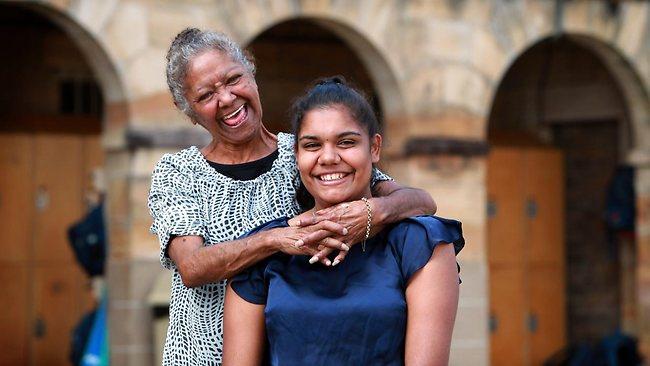Foster child Kygim King lives her law school dream
AS an Aboriginal girl who was fostered out at just seven days old, Kygim King's chances of finishing high school were not bright.

AS an Aboriginal girl who was fostered out when she was just seven days old and raised by a single woman, Kygim King's chances of finishing high school were not bright.
No other member of her birth or foster families had ever made it that far. But the 18-year-old from Kempsey has defied the odds by completing her HSC at one of Sydney's most elite private colleges and is now starting law school. Ms King arrived at Kincoppal-Rose Bay school in Sydney's eastern suburbs in Year 10 on a scholarship from the Australian Indigenous Education Foundation that was set up by former lawyer and investment banker Andrew Penfold in 2007.
"I was scared, it was challenging at first," Ms King said.
"I was so far away from home and I felt like I came from a different world. Kempsey is more laid-back. There are high expectations in Rose Bay. (But) I thought, I've got this opportunity, I'm not going to throw it away."
Ms King is one of 2000 indigenous students given the opportunity to study at a top boarding school thanks to Mr Penfold's herculean fundraising efforts.
Mr Penfold in 2009 convinced then education minister Julia Gillard and prime minister Kevin Rudd to invest $20 million in his foundation. He made a promise in Canberra to match that with $20m from the private sector over 20 years - and drove back to Sydney trembling with the magnitude of his task. But in just 2 1/2 years, Mr Penfold has already reached his target. Now, he says, he is ready to "really" stretch himself.
"What I would love to do is really be ambitious and think about how we can educate not 2000 students but 10,000 students," he said.
The former banker knows first-hand the transformative power of education. At 15, he was running around with a gang of local boys, skipping school, causing trouble and getting drunk. His family feared he would land in jail.
Instead, he graduated from law school with honours and established a career as a commercial lawyer and banker.
What saved him, he believes, was a good education at one of Sydney's exclusive private schools on the affluent north shore.
He believes the same opportunities should be given to indigenous students, and already the results of his work are telling.
Students who have received scholarships from the foundation have a Year 12 retention rate of 88 per cent, compared with the national retention rate for indigenous students of 47 per cent in 2010 and 79 per cent for all students.
"The indigenous predicament is one of our most pressing national challenges," Mr Penfold said.
"The only way to break that cycle of disadvantage is through quality education.
"We need to ensure that our most disadvantaged students have access to our best schools."
Ms King's foster mother, Beryl Hoskins, left school at 16 because she was forced to earn a living. She worked at David Jones, and later in factory jobs.
But she was determined to build a better life for her daughter and shares Mr Penfold's belief in the importance of education.
"I had nothing myself, but I wanted only the best for her," she said. "She comes before anything." Ms Hoskins, a tiny but formidable woman from the Dunghutti people on the NSW mid-north coast, scraped enough together while living on a pension to send her foster daughter to a Catholic school. But she believed the only way for her to reach her potential was to finish her senior years in Sydney.
"They've got everything going for them down here," she said.
"They haven't got anything like that up there."
Ms Hoskins said the experience changed Ms King from a "sooky" 15 year old to a mature and focused young woman.
"Once she got to Kincoppal she just took off," Ms Hoskins said. "She's a young lady now, and I'm so proud of her."
Ms King said that in Kempsey she had barely passed English and did not take school seriously.
"I was really dependent on my mum, she did everything for me," she said. "Coming to Kincoppal really changed that. I had to do everything for myself, and that was hard, but now I'm much more confident."
Some educators have criticised the AIEF for taking the brightest indigenous students out of their communities.
Mr Penfold said he had never suggested AIEF could solve the problems facing indigenous education, but instead was determined to open doors for those who wanted an opportunity.
"At the moment we have 10,000 schools," he said.
"Some of those schools are great schools, some are terrible schools. We need to make sure our most disadvantaged kids have the ability to access the good schools if they choose to."
Federal School Education Minister Peter Garrett said the government was committed to halving the gap between indigenous and non-indigenous education results. He said AIEF was sending a powerful message that there was no difference in the capacity of indigenous and non-indigenous young people.


